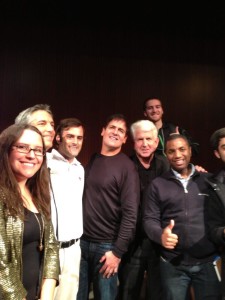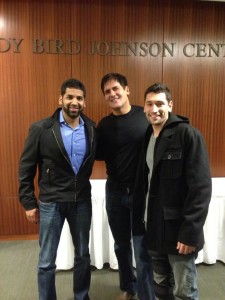
Josh Baer, Bob Metcalfe, instructors with Longhorn Startup and Mark Cuban
By LAURA LOREK
Founder of Silicon Hills News
Since selling Broadcast.com to Yahoo for $5.7 billion in 1999, Billionaire Mark Cuban has invested in 80 startups.
But his entrepreneurial ventures began as a kid growing up in Pittsburgh.
“As long as I can remember I was an entrepreneur,” Cuban said.
At the age of nine and ten, Cuban packaged baseball cards and sold them to his friends.
At 12, he wanted new basketball shoes. His dad told him that his tennis shoes were just fine and when he had a job he could buy any kind of shoes he wanted. A family friend had some garbage bags he wanted to get rid of and offered them to Cuban. So Cuban sold them door-to-door to earn enough money to buy the basketball shoes.
Cuban recounted the story Thursday night before a packed audience of more than 800 people at the University of Texas Longhorn Startup’s Demo Day. The semester-long course for undergraduates at UT aims to teach them entrepreneurial skills and how to found a startup. One of its instructors, Bob Metcalfe, professor of innovation at UT, Ethernet inventor and co-founder of 3Com, interviewed Cuban at the Lady Bird Johnson Auditorium following pitches by 14 student-run startups.
During the hour-long talk, Cuban provided insights into his entrepreneurial journey and lessons learned along the way.
Early on, if it wasn’t garbage bags, it would have been something else, Cuban said.
At 16, Cuban’s mom introduced him to stamp collecting. He consumed information about stamps. At stamp shows, Cuban would buy a stamp from one dealer for 50 cents and walk down to the other side of the show and sell it for $50. Selling stamps helped him pay for school.
Cuban’s College Years
He left Mt. Lebanon High School early because he couldn’t take business classes. He went to the University of Pittsburgh and took classes. He earned enough credits to finish high school. He ended up transferring to the Kelley School of Business. He researched and discovered it was one of the top ten business schools in the country and it had the lowest tuition. At Indiana University in Bloomington, Cuban earned his undergraduate degree in business. He also did a year and a half of his MBA.
“I wanted to take all the hardest classes that I could my freshman and sophomore years and I promised myself I wouldn’t drink and then my junior and senior years when I was 21 I would take all the easy classes and party like a maniac,” Cuban said. “And that’s what I did.”
He also ran a bar in college, which went out of business.
After he left college, Cuban worked for nine months for Mellon Bank in Pittsburgh. He learned how to program there in Fortran. But he didn’t like banking much so he moved to Dallas.
Moving to Dallas
When Metcalfe asked him why, Cuban said “For fun, sun, money and women.”
He had friends who moved to Dallas. He liked the tropical climate. He lived in the village with six guys in a three-bedroom apartment and he slept on the floor.
“I loved every minute of it,” Cuban said.
He worked as a bartender at night. He bought a Texas Instruments 99/4A computer and taught himself to program. He really liked it. Then he got a job at Your Business Software, a retail store, selling Peachtree software and different applications. He did that for nine months and then he got fired. That’s when he started his own PC and software consulting business called MicroSolutions. They set up PCs and software for businesses and set up local area networks.

The crowd clamoring to get a picture with Mark Cuban and Bob Metcalfe at the end of Longhorn Startup Demo Day
At the same time Cuban ran MicroSolutions, a kid in Austin was launching a PC business, Metcalfe said. He asked Cuban if he ever ran into him.
That prompted Cuban to talk about the importance of history in understanding the world today.
“One of the things kids are missing today is a sense of history,” Cuban said. They Google something and if it doesn’t come up in Google, it didn’t happen. But there’s a ton of stuff that isn’t in Google, Cuban said. What kids don’t know is if the companies went out of business, their servers aren’t online anymore and they can’t find out about them. Entrepreneurs need to dig deeper to find information on people who have tried an idea and failed at it so they don’t repeat those same mistakes, he said.
Yet one of the most brilliant things Cuban learned from was this kid in Austin who would post the price of generic computer parts in PC Week Magazine. Cuban drove down to Austin and bought a bunch of computer parts directly from him. When he got back to Dallas, Cuban wrote him a letter.
“Michael, if you keep this up, things will go really well for you,” Cuban said. That kid, of course, was Billionaire Michael Dell. Today, they still crack up about it, Cuban said.
“How did you decide to sell your company to CompuServe?” Metcalfe asked.
“They offered, and I said yes,” Cuban said.
He wanted to retire by the time he was 35. MicroSolutions had $30 million a year in revenue and was very profitable, Cuban said. He sold the company to CompuServe for $6 million. After that he worked for them for a little bit. But then he got a lifetime pass on American Airlines, he retired and “partied like a rock star.”
The founding of AudioNet, later to be renamed Broadcast.com
Cuban and his friend Todd Wagner started AudioNet so they could listen to Indiana basketball games on the Internet. They started the company in the second bedroom of Cuban’s house.
Cuban had a $39 Video Cassette Recorder that recorded for eight hours. He would record radio stations and then import that programming into his computer and eventually post it to the Internet. They had 600 to 700 radio stations that they would post online. The company had tens of thousands of hours of audio content online and more than one million visitors daily coming to the site to listen to it.
Cuban and Wagner started AudioNet in 1995, the same year that Netscape went public. They sold it four years later to Yahoo for $5.7 billion in stock.
In 2000, Cuban spent $285 million of his fortune to buy the Dallas Mavericks National Basketball Association team from Ross Perot Jr.
Cuban always loved basketball. He didn’t play in high school though. He said he was five foot eight and weighed 240 pounds in high school. Today, he’s six foot three and weighs 205 pounds.
The Mavs are a different type of entity, Cuban said. The team is unlike any business he has ever run. Even though he writes the checks, the team belongs to the community, he said. In 2011, the Dallas Mavericks became NBA champions. To turn the team around, Cuban focused on putting players in a position to succeed.
In addition to owning the Dallas Mavericks, Cuban also stars on the popular television show Shark Tank on ABC which features entrepreneurs pitching venture capitalists with the hopes of landing an investment.
“It’s a lot of work,” Cuban said.
The so-called “Sharks,” successful businessmen and women who invest their own money, don’t know anything about the people who pitch to them, Cuban said. What takes just 10 minutes of TV time, though, can take two and half-hours of interrogation off camera, Cuban said.
The investors, or Sharks, are allowed to do due-diligence after they invest in the companies. In fact, one time Cuban made an investment in a woman’s company but her husband didn’t believe in paying taxes and hadn’t ever paid them, Cuban said. So he was able to get out of that deal.
Out of the 80 startups Cuban has invested in, 28 came from Shark Tank pitches.

Mark Cuban and the rest of the cast of Shark Tank, photo courtesy of Shark Tank
“Shark Tank has really ignited the entrepreneurial fire in a lot people,” Cuban said. “It’s really inspired a lot of people to start their own businesses.”
Out of his 28 investments, Cuban has had one company fail and another that should shut down, he said. But the others are either dragging along or doing very well, he said.
“Shark Tank is the most successful one hour selling platform in the world,” Cuban said. Lani Lazzari, owner of Simple Sugars, sold nearly $1 million worth of her body scrub products after being featured on the show for 10 minutes, Cuban said. He invested $100,000 for a 33 percent stake in her company. She recently turned down a buyout offer. She wants to get to $30 million in annual revenue, he said.
Now is an amazing time to start a business, Cuban said. With a laptop, phone, Internet connection and Amazon account, people can create any kind of business, Cuban said.
Entrepreneurs only fail because of lack of effort and brains
“The one thing in our lives every entrepreneur can control is effort,” Cuban said. Companies don’t fail for lack of anything but lack of effort and brains, he said.
The biggest error companies pitching to Cuban make is that they don’t have any sense of history, he said. Some entrepreneurs also underestimate the amount of effort it takes to turn their ideas into reality.
“It takes time, it’s a grind,” Cuban said. “There are no shortcuts. You’ve got to grind and grind.”

Mark Cuban meets the team behind The Zebra, an Austin startup he invested in but has never met in person until Longhorn Startup Demo Day.
Entrepreneurs need to learn from what’s been done before, Cuban said. He likes to retweet articles on business failures so people can learn from them. That information becomes more valuable because it’s harder to find, Cuban said.
The luckiest guy in the world
An audience member asked Cuban what he regrets not doing.
“It’s turned out pretty well – nothing,” Cuban said. “Someone’s got to be the luckiest guy in the world and luck has played a big part in the level of my success. And I’m just glad it’s me.”
To pitch Cuban, send him an email to MCuban@gmail.com. He reads the first paragraph and if he’s interested, he’ll read more and send the entrepreneur some follow up questions. If he likes the answers, then he might invest. He has invested $10 million in startups he discovered through email pitches and with $6 million worth of those investments he has never even met the entrepreneur, Cuban said.
![]() A graduate of the Longhorn Startup class for undergraduates at the University of Texas, LanternCRM just landed $250,000 in angel funding.
A graduate of the Longhorn Startup class for undergraduates at the University of Texas, LanternCRM just landed $250,000 in angel funding.
